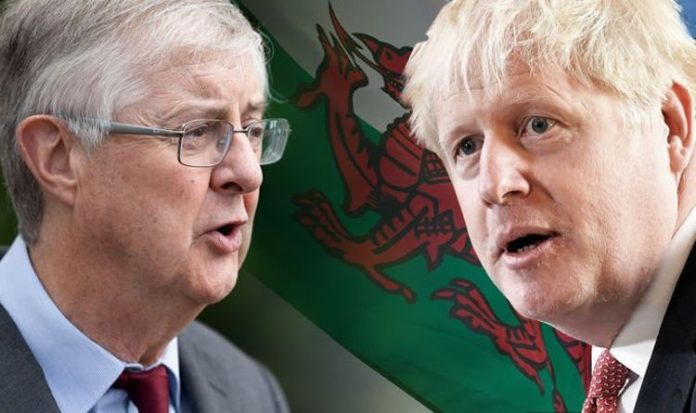Prime Minister Boris Johnson’s Internal Market Bill has divided both the UK and the EU, especially after the Northern Ireland Secretary Brandon Lewis admitted it broke international law in a “specific and limited way”. Yet, the bill was presented as a “legal safety net” by Downing Street, and an attempt to ensure Northern Ireland could still have “unfettered access” to Britain’s markets after Brexit. While the bill threatens the Northern Ireland Protocol, it may also have an impact on calls for independence, not in Scotland but in Wales.
This is surprising as the bill was designed to avoid new trade barriers arising between the UK’s four countries once it leaves the bloc.
However, as the UK and EU website pointed out, “in its current form”, the bill “suggests a significant recentralisation of power”.
A report, written by Professor Nicola McEwen this week, explained: “It reserves competence over state aid and subsidies to the Westminster Parliament.
“It gives the UK Government new spending powers in devolved areas.

Welsh First Minister Mark Drakeford and Prime Minister Boris Johnson (Image: Getty)

Boris Johnson celebrating with EU figureheads when the withdrawal agreement was in the process of being signed last year (Image: Getty)
“These could potentially be used to bypass the devolved governments and fund organisations directly to support UK-wide priorities and ‘promote the UK’s shared values’.”
The report also claimed Westminster has “barely blinked” when passing other laws that impact devolution — and this bill has recently passed the first hurdle on its way to becoming enshrined in law.
In another UK and EU article, Professor Daniel Wincott pointed out that Westminster “instructed its officials to stop working on the Internal Market Bill with their Welsh counterparts” earlier this year.
The Welsh Government did agree with Westminster in 2018 that areas such as food labelling, farmers’ support and energy efficiency, which are currently regulated by the EU, would be devolved to Cardiff.
READ MORE: How Cummings and Gove planted seeds for withdrawal agreement row

Boris Johnson has come under fire for the Internal Market Bill (Image: Getty)
However, in July, Westminster argued there should be a level playing field across the UK’s four nations, so the market is “seamless”.
A spokesman for the Welsh Government said at the time: “Any new system must have independent oversight and dispute resolution.
“Unfortunately, the UK Government has not managed to share the paper with us, and Welsh ministers have had no recent discussions with the UK Government on these issues.
“Any attempt to unilaterally impose a system will be deeply damaging.”
DON’T MISS
Boris Johnson’s legal defence for Northern Ireland move explained [INSIGHT]
‘Rushed’ NI Protocol jeopardises ‘UK future as independent nation’ [EXPLAINED]
‘Ireland parties united in horror’ as UK ‘alters’ Brexit agreement [EXPOSED]

The Internal Market Bill has just passed through its first obstacle on the way to becoming enshrined (Image: Express.co.uk)
When the Internal Market Bill was released, the Welsh Government furiously dubbed it “an attack on democracy” which could “sacrifice the future of the union by stealing powers from devolved administrations”.
Professor Wincott explained that the internal bill has raised particular concerns for Wales, which received more structural support from the EU than the rest of the UK.
For instance, the M4 relief road which was rejected by the Welsh Government, may be pushed to go ahead by Westminster after Brexit.
Professor Wincott pointed out that the UK Government “might fund it directly” which would “in effect overrule” the devolved government.

Scotland’s First Minister Nicola Sturgeon was expressed fury at the Internal Market Bill (Image: Getty)
To find out details of coronavirus in your area, please fill in your postcode below.
He added: “With support from local government and Westminster MPs, they hint, even planning rules could be overcome.”
This contradicts the claims that the new bill will bring a “power surge for devolution”.
Additionally, the chairman of Welsh nationalist party YesCymru, Sion Jobbins, recently told Express.co.uk that the main focus for campaigners is to decentralise power.
He said: “Our main priority at the moment is building the campaign in Wales, not seeking permission from Westminster.
“We know also that once the Scottish referendum is held — and we believe we will see a vote for Scotland becoming a nation state — the situation in Wales will change dramatically as the UK will cease to exist.”







